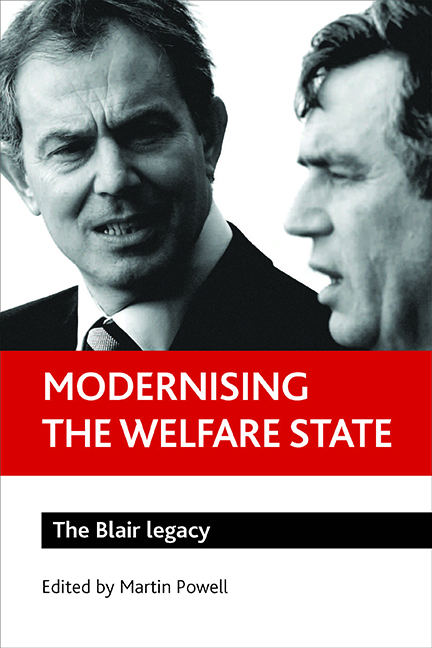Book contents
- Frontmatter
- Contents
- List of tables and figures
- Acknowledgements
- Notes on contributors
- one Introduction: modernising the welfare state
- two The NHS after 10 years of New Labour
- three Housing policy: coming in out of the cold?
- four Social security and welfare reform
- five Social care under Blair: are social care services more modern?
- six Education: from the comprehensive to the individual
- seven Controlling crime and disorder: the Labour legacy
- eight Social investment: the discourse and the dimensions of change
- nine Risk and the Blair legacy
- ten Going private?
- eleven Choice in public services: ‘no choice but to choose!’
- twelve The conditional welfare state
- thirteen The stages of New Labour
- fourteen Social Democratic reforms of the welfare state: Germany and the UK compared
- fifteen Conclusion: the Blair legacy
- Index
- Also available from The Policy Press
one - Introduction: modernising the welfare state
Published online by Cambridge University Press: 21 January 2022
- Frontmatter
- Contents
- List of tables and figures
- Acknowledgements
- Notes on contributors
- one Introduction: modernising the welfare state
- two The NHS after 10 years of New Labour
- three Housing policy: coming in out of the cold?
- four Social security and welfare reform
- five Social care under Blair: are social care services more modern?
- six Education: from the comprehensive to the individual
- seven Controlling crime and disorder: the Labour legacy
- eight Social investment: the discourse and the dimensions of change
- nine Risk and the Blair legacy
- ten Going private?
- eleven Choice in public services: ‘no choice but to choose!’
- twelve The conditional welfare state
- thirteen The stages of New Labour
- fourteen Social Democratic reforms of the welfare state: Germany and the UK compared
- fifteen Conclusion: the Blair legacy
- Index
- Also available from The Policy Press
Summary
‘A new dawn has broken. Isn't it wonderful?… We have been elected as New Labour and we will govern as New Labour.’ (Tony Blair, election night, 2 May 1997)
Introduction
This is the third book in what I am terming my ‘New Labour trilogy’. The first book, New Labour, new welfare state (Powell, 1999), was one of the first books to examine the social policy of New Labour's ‘Third Way’. The second book, Evaluating New Labour's welfare reforms (Powell, 2002), focused on manifesto promises and Annual Reports. This third book, Modernising the welfare state, looks back at the longest-serving Labour government and Labour Prime Minister in British history, to examine ‘the Blair legacy’.
This book examines the ‘hand of history’ on Tony Blair's shoulders, and there is no shortage of material on his legacy. For example, websites such as Blairwatch.co.uk and BlairLegacy.org.uk have been set up, and a search for the term ‘Blair + Legacy’ brings about 541,000 hits on Google (04/02/08).
This book examines the main changes to the welfare state since New Labour came to power in 1997, updating existing accounts, as they tend to focus on the first term of government up to 2001. The main focus of the book, however, is to examine the degree of change that has occurred in the welfare state – the book's analytical template is New Labour's modernisation of the welfare state. The elements of modernisation are examined to see whether there was a coherent modernisation package in different sectors, or whether modernisation actually means different things in different sectors. Similarly, the trajectory of change is examined to determine when the major changes occurred, and whether later changes built on earlier ones, or conflicted with them. Finally, the importance of change is examined using Hall's (1993) orders of change.
Modernising the welfare state and the party of welfare reform
The 1997 Labour election manifesto stated that ‘We will be the party of welfare reform’. Blair's introduction to the manifesto claimed that: ‘in each area of policy a new and distinctive approach has been mapped out, one that differs from the old left and the Conservative right’. Labour made large claims about welfare reform (Powell, 1999, pp 281-2): in the first Queen's Speech, Blair launched a crusade for welfare reform, singling out modernisation of the £90 billion-a-year welfare system as the ‘big idea’ of the Labour government.
- Type
- Chapter
- Information
- Modernising the Welfare StateThe Blair Legacy, pp. 1 - 16Publisher: Bristol University PressPrint publication year: 2008



